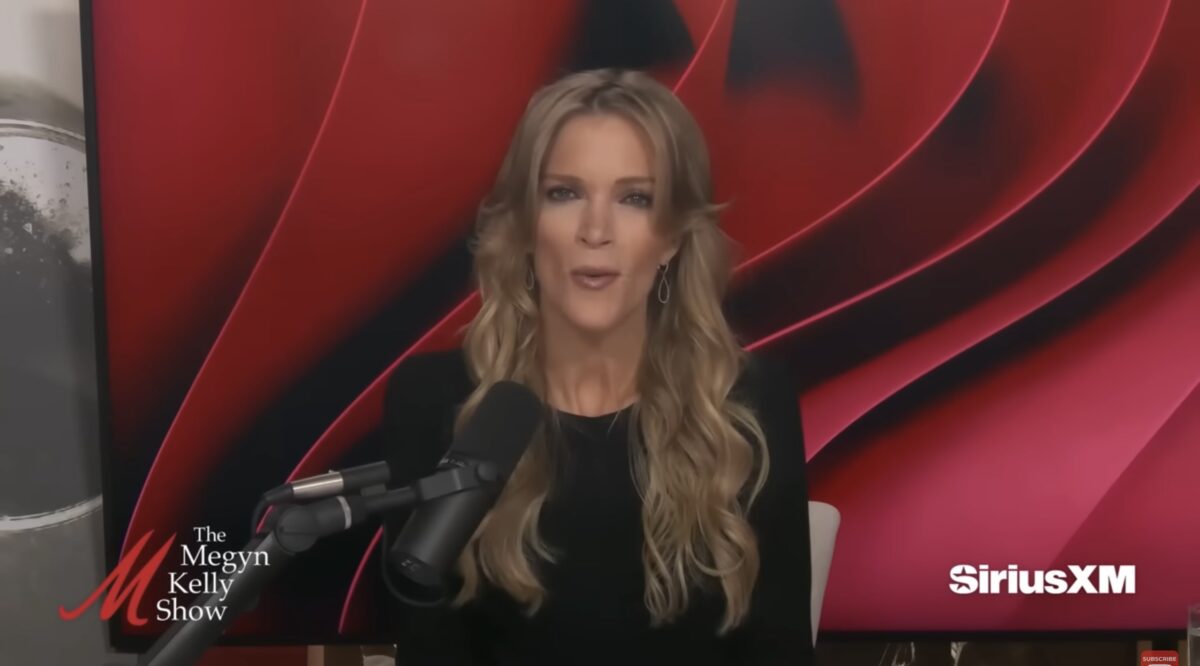Megyn Kelly Is the New Rush Limbaugh — And Prototype for the Future of Political Media

The Megyn Kelly Show/YouTube
During Monday’s SiriusXM show, Megyn Kelly gave a shout-out to a column I’d written, which I immediately learned about from my phone lighting up with texts from college friends in Kansas. This has happened before — but usually when she’s mocking me. This time, however, she praised my piece about media overreaction to Trump’s tariffs and panic about “empty shelves” that never quite arrived.
One friend wrote: “I like her. She fills my Rush void.”
Yes, I have good friends who were giant “ditto heads,” but I got that text on the subway, on my way to lunch with a former colleague of Kelly’s who is decidedly not a fan. I mentioned the exchange, casually tossing it out as a column idea — and, well, here we are.
When Rush Limbaugh died in 2021, conservative media lost more than just a talk radio icon. It lost its emotional narrator — the singular voice who interpreted the world for millions of listeners, distilling outrage into punchlines and partisanship into identity. In the years since, no one has fully filled his shoes. But Megyn Kelly has come the closest.
She doesn’t have the cartoonish bombast or the AM radio nostalgia, but she has built something just as potent: a smarter-than-you’d-expect, snarky, self-produced daily show that combines cultural combat, media skepticism, and a reliable dose of red meat — with a polish few in the space can match. The Megyn Kelly Show draws over a million podcast downloads a week, 3.7 million YouTube subscribers, and generates an estimated $25 million annually. It’s a lean, nimble machine that has become required daily listening for millions of conservatives — especially those craving something smarter than partisan screaming.
Now in the traditional cable news, talk radio ecosystem, Sean Hannity is still very much the dominant primordial beast of conservative media. But Megyn is becoming the progenitor of whats looking like a remarkably lucrative future as old (non Fox-related) media constructs collapse.
Credit goes not just to Kelly’s instincts, but to executive producer Steve Krakauer, a veteran media hand (and Mediaite alum) whose editorial hand helps shape the show’s rhythm and sharp edge. Their combined sensibility — irreverent, anti-elite, legally precise — has filled the exact space Limbaugh once owned: not just conservative talk, but conservative identity.
But let’s be clear: Kelly has also inherited some of Limbaugh’s rougher traits, particularly when it comes to trans issues. Her rhetoric around gender identity isn’t just strident, it’s confrontational — and aimed at intentionally angering people she knows will be offended. She regularly misgenders trans guests and frames trans existence itself as a threat to “truth” or “womanhood,” reducing complex issues to ideological clickbait. To many, it feels less like legitimate debate and more like open hostility. But that’s the point. And it rates.
This isn’t a side note — it’s central to her brand. Just as Limbaugh once joked about AIDS victims and mocked “feminazis” to wild applause, Kelly now uses the culture war around gender as both a punchline and a battering ram. It’s the same formula: provoke outrage, ride the backlash, convert it into brand loyalty. And it works.
Yet what makes Kelly different — and more complicated — is her willingness to also occasionally aim fire at her own side.
Her skepticism of Trump’s role in burying the Epstein files was one of her most striking recent moves. While most conservative influencers fell in line with Trump’s bizarre demand to “stop talking about Epstein,” Kelly not only refused, she noted how Trump’s most loyal toady, Charlie Kirk, for seemed to follow his orders (and plays a different role), and called out Fox’s Laura Ingraham’s apparent shifting positon. She most notably called out Pam Bondi by name, questioned the administration’s opacity, and asked why self-proclaimed anti-elite warriors suddenly had nothing to say.
That episode wasn’t an anomaly. Kelly has also openly mocked House Republicans for their dysfunction and inability to govern, criticized Fox News for what she suggested was cowardly post-election coverage. She’s questioned Ron DeSantis’s political instincts, pushed back on conservative COVID minimizers who downplayed early risks, and gone after right-wing influencers who hyped bogus “plandemic” narratives.
Her core audience may not always agree, but Kelly’s willingness to lob grenades inward — even when it costs her applause — is part of what makes her feel authentic to listeners who don’t want straight propaganda.
It is a reminder that Kelly doesn’t always play for Team Red, at least in the eyes of many of the side’s most ardent true believers. Like all successful broadcasters, she plays for herself, her audience, and her version of what she deems to be true. She does traffic in rumor and unconfirmed reporting, of which I have been critical. But she is also willing to call bullshit, even if if it’s occasionally on her listener’s “team.” They know she’ll entertain unproven claims, then interrogate them. That’s part of the deal. And it’s entertaining. Irresponsibly so? Sometimes, sure. But that’s as sure a sign of the current media times as any.
The irony, of course, is that she started as one of Trump’s most visible skeptics. Her 2015 debate clash with the then-candidate — in which she asked pointedly about his treatment of women — launched a public feud that helped define early Trumpism. Yet in 2024, she appeared at a Trump campaign event, praised him warmly, and now regularly defends him on air.
That shift looks cynical. But it’s likely something more strategic — a sign that both she and Trump have come to understand their mutual value. She gets renewed relevance and insider access. He gets validation from a former adversary who now signals mainstreaming within elite conservative circles.
Her platform reflects this evolution. Unlike the trench warfare of cable news, Kelly’s audience floats in a murkier middle: anti-institutional, post-partisan, yet unmistakably right-wing. She hosts everyone from DeSantis, to RFK Jr., to legacy journalists (like Jake Tapper), to anti-woke crusaders. Her ideology is less defined than her sensibility — skeptical, combative, and vaguely libertarian.
Yes, she retrofits some of her stances to match her audience. Her shifts on COVID, gender, and media trust often look like feedback loops rather than conviction. But she rarely drifts into full conspiracism, and her commentary is more often incisive than hysterical.
So yes — Megyn Kelly is the new Rush Limbaugh.
Not because she imitates him, but because she replaced him: Same audience. Same energy. Same narrative control. Less carnival barker. More cross-examining lawyer. But no less influential.
In an age when political media rewards outrage over analysis, Megyn Kelly’s rise is both a blueprint and a warning. She’s the future — for better or worse.
This is an opinion piece. The views expressed in this article are those of just the author.
New: The Mediaite One-Sheet "Newsletter of Newsletters"
Your daily summary and analysis of what the many, many media newsletters are saying and reporting. Subscribe now!






Comments
↓ Scroll down for comments ↓